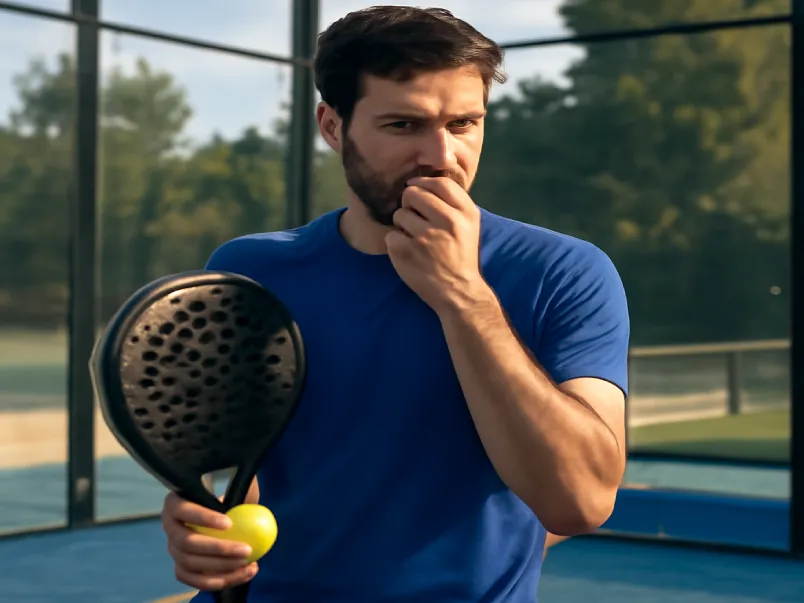The Invisible Game Within the Game
Imagine this scenario: You’re up 5-2 in the second set, cruising toward victory. Your opponents seem rattled, and you start thinking about the win. Suddenly, you miss an easy volley. The tension rises, your mind starts racing, and before you know it, you’ve dropped the next few points. You lose the set, and then the match. What happened?
While physical skill and technical mastery are essential for padel, the real differentiator between a good player and a great one often comes down to mental toughness. The best players in the world don’t just rely on their athleticism; they excel mentally, maintaining poise and focus under pressure. This article aims to uncover the mental strategies used by top padel pros to give you practical tools to enhance your mental game and close out matches with confidence.
What is Mental Toughness in Padel? (It’s More Than Just “Staying Positive”)
When we talk about mental toughness in padel, we aren’t referring to simple positivity or trying to keep your spirits up. Mental toughness, in this context, is the ability to perform at the highest level consistently—regardless of the score, previous mistakes, or the intensity of the match. It involves several key components that can help you stay sharp throughout the game and recover when things don’t go according to plan.
Key Components of Mental Toughness
- Emotional Control: Managing your emotions is crucial, especially when frustration or excitement threatens to derail your game. In padel, your emotional state can directly impact your performance. The ability to stay calm after a lost point or a poor shot is essential to keeping your focus intact.
- Focus and Concentration: Staying focused on the present moment and your next move is more than just blocking out distractions. It’s about honing your ability to remain engaged with every shot, avoiding the temptation to dwell on past mistakes or think too far ahead.
- Resilience: Padel is a fast-paced, dynamic sport. Setbacks are inevitable. Resilience is the capacity to bounce back quickly from a mistake or unlucky point. Top players can shift their mindset immediately after a missed shot, resetting and refocusing on the next point.
- Handling Pressure: In crucial moments, like tie-breaks or match points, the pressure can feel immense. The ability to thrive in these situations—rather than shrink under pressure—is a defining trait of mentally tough players.
- Confidence: Confidence is the bedrock of mental toughness. It’s about trusting your skills, training, and instincts, even when you’re not playing your best. Confident players are more likely to make bold decisions and execute under pressure.
The Pre-Match Mindset: Building Your Foundation
Tip from the Pros: The Power of Routine
Professional players swear by the power of a consistent pre-match routine. This ritual helps signal to your brain that it’s time to shift into competition mode. A specific warm-up, a few minutes of quiet visualization, or even listening to motivating music can set the tone for the match ahead.
Actionable Advice:
Develop your own pre-match routine. Whether it’s stretching, visualizing your shots, or listening to your favorite pump-up playlist, create a routine that gets you into the right mental space before you step on the court.
Tip from the Pros: Process Over Outcome
Focusing too much on winning can make you anxious and take your focus away from what really matters: executing your skills. Instead of stressing over the score or the result, professional players focus on the process of playing well.
Actionable Advice:
Set process-based goals for yourself. For example, decide that you will focus on moving your feet during every point or ensuring good communication with your partner. This keeps you grounded in the present and avoids overthinking the final score.
Tip from the Pros: Strategic Visualization
Visualization is a powerful tool that top athletes use to mentally prepare. Spending a few minutes before a match imagining yourself making successful shots, handling pressure, and staying calm can significantly boost your confidence and readiness.
Actionable Advice:
Take 5-10 minutes before the match to close your eyes and visualize yourself playing a perfect match. Picture yourself handling every scenario, from difficult shots to intense moments, with composure and success.
The In-Match Battle: Staying Sharp Under Fire
Tip from the Pros: The “Next Point” Mentality
Top players know that every point is a fresh start. They don’t dwell on the last point—whether they won or lost. A physical or verbal ritual with your partner can help reset your mind after each point, giving you the chance to refocus.
Actionable Advice:
Develop a ritual with your partner to reset after every point. This could be something as simple as tapping rackets or saying a word like “next point” to reinforce the idea that the past is behind you, and the next point is your focus.
Tip from the Pros: Control Your Breathing, Control the Game
Breathing is often overlooked as a mental tool, but it’s incredibly powerful. By focusing on slow, deep breaths between points, you can lower your heart rate, calm your nerves, and gain clarity on your next move.
Actionable Advice:
Try a breathing technique where you inhale for 4 seconds, hold for 1 second, and exhale for 6 seconds. This practice helps you stay in control of your emotions and clears your mind between points.
Tip from the Pros: Focus on Controllables
In every match, there are uncontrollable factors: the weather, a lucky bounce, or even questionable line calls. But what you can control is your effort, attitude, and tactical decisions. By directing your attention to the things you can control, you will avoid becoming frustrated by things outside your control.
Actionable Advice:
Whenever you feel yourself getting frustrated, ask yourself, “What can I control right now?” Whether it’s your effort or your shot selection, redirect your focus to something you can influence.
Tip from the Pros: Positive & Practical Communication with Your Partner
A strong partnership on the court can make all the difference. Positive communication fosters a collaborative mindset, while negative comments can erode trust and focus. Professionals use brief, positive statements to keep their partner’s energy high and the team mindset intact.
Actionable Advice:
Use positive “we” statements with your partner, such as “We’ve got this,” or “Let’s focus on the return.” If you need to offer advice, keep it brief and constructive. The goal is to stay positive and reinforce your teamwork.
Handling Adversity: Turning Setbacks into Comebacks
Tip from the Pros: Embrace the “Ugly Win”
Not every match is going to be pretty. Even the pros win on days when they don’t play their best. The key is to adjust your strategy to the conditions of the day and find a way to win, even when things aren’t clicking perfectly.
Actionable Advice:
When things aren’t going well, focus on finding a way to win. Identify the minimum effective strategy—whether it’s keeping the ball in play longer, staying extra focused on your serves, or simply being more aggressive.
Tip from the Pros: Reframe Mistakes as Information
Instead of getting frustrated by errors, elite players reframe mistakes as learning opportunities. A missed shot becomes a chance to analyze what went wrong and correct it for the next point.
Actionable Advice:
Next time you make a mistake, take a moment to analyze it calmly: “Why did that happen?” Whether you were late to prepare your shot or misjudged the angle, quickly identify the lesson and move on.
Tip from the Pros: Use the Scoreboard to Your Advantage
The scoreboard can be both a motivator and a pressure point. When leading, it’s important to stick to your game plan and stay aggressive. When trailing, use the situation as an opportunity to play with freedom, focusing on getting every ball back and putting pressure on your opponents.
Actionable Advice:
If you’re ahead, maintain pressure by sticking to your strategy and not letting up. If you’re behind, take risks and play with the freedom of “nothing to lose.” Play aggressively, force errors, and make your opponents feel the pressure.
The Post-Match Debrief: Learning and Letting Go
Tip from the Pros: Analyze, Don’t Criticize
Self-analysis after a match is essential for improvement, but it’s important to avoid self-criticism. The goal is to learn from your performance without being too hard on yourself.
Actionable Advice:
After each match, ask yourself two questions: “What did I do well?” and “What is one thing I can improve?” This balanced reflection helps you learn while maintaining a positive mindset.
Tip from the Pros: The 24-Hour Rule
After a win or a loss, top players allow themselves a short window to reflect. But after 24 hours, they move on and focus on the next match. Holding on to the past only distracts from the present.
Actionable Advice:
Give yourself permission to feel happy about a win or disappointed with a loss, but only for 24 hours. Then, let it go and shift your focus to the next training session or match.
Conclusion: Your Mental Game is Your Greatest Weapon
Mental toughness is not an innate gift—it’s a skill that can be developed with practice, just like your technical shots or physical fitness. By working on your mental game with the same dedication as your forehand or backhand, you’ll start to see consistent improvements in your performance.
Final Takeaway:
You will never play a perfect match, but you can always have a strong mental game. Start by incorporating just one or two of these pro tips into your next match and see how your mindset helps you close out games with confidence and composure.
Inspiring Closing Thought:
The court is a reflection of your mind. Train it well, and your results will follow.
Pro Mentality in 30 Seconds – A Quick Reference Guide:
- Before: Stick to your routine. Visualize success.
- During: Breathe between points. Focus on the “next point.” Control the controllables.
- After: Analyze, don’t criticize. Then, let it go.
FAQs
1. What is mental toughness in padel?
Mental toughness in padel refers to the ability to maintain a high level of performance, regardless of the score, pressure, or previous mistakes. It involves emotional control, focus, resilience, confidence, and the ability to handle pressure, which allows players to stay sharp and recover quickly during a match.
2. How can I improve my mental toughness in padel?
Improving mental toughness involves consistent practice. Develop a solid pre-match routine, focus on controlling your emotions during the match, and use techniques like visualization and breathing exercises. Additionally, adopting a “next point” mentality and reframing mistakes as learning opportunities can also help.
3. Why is mental toughness important in padel?
Mental toughness is crucial in padel because it helps you stay focused under pressure, bounce back from mistakes, and maintain confidence throughout the match. It allows you to perform at your best, even when you’re not playing perfectly, and helps you handle key moments like tie-breaks and match points with poise.
4. What is the “next point” mentality?
The “next point” mentality is a mental strategy where players focus on the present moment and forget about the previous point, whether it was a win or loss. This mindset helps you reset after every point, preventing negative emotions from affecting your performance in the next rally.
5. How can visualization help in padel?
Visualization is a powerful technique where players mentally rehearse successful shots, strategies, and handling pressure. By imagining yourself performing well, you build confidence and readiness for real match situations, which improves focus and performance.
6. How can I handle pressure in critical moments of a padel match?
Handling pressure involves staying calm and focused, using strategies like controlled breathing and staying in the present moment. Refocusing on your game plan and remembering that you can only control what’s in your hands—your effort, attitude, and decision-making—will help you stay mentally strong during crucial moments.




